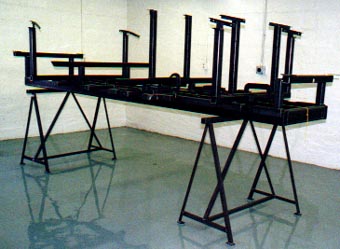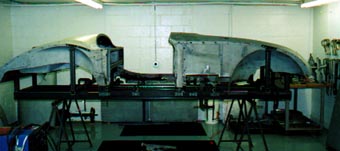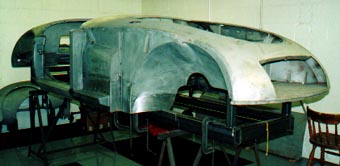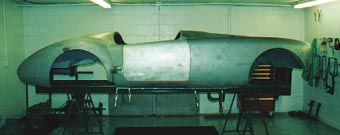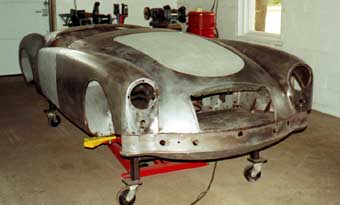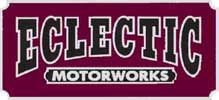
|
Eclectic Motorworks, LLC 445 West 22nd Street Holland, MI 49423 616.355.2850 carlheideman@yahoo.com |
|
|
|
home page |
|
background |
|
services & expertise |
|
events & training |
|
shop tour |
|
|
|
The key to our Body Restorations are our jigs and fixtures. Our main fixture emulates the MGA's frame, except our tolerances are much tighter than we've seen on frames. It's common and acceptable for frames to have 1/4" or more variance on some dimensions (in fact, the factory manual lists some tolerances as +-1/4"). We built our jigs and fixtures to 1/32" tolerances. We start a body restoration with measurements of the data we've found to be key. These measurements set a baseline and give us an idea of how good the body is to start with. Following this, all paint and rust is stripped from the body. Most of the stripping is done by a local sandblasting service. mount the body on one of our rotisseries so that the sandblaster has good access and won't "tweak" the body while rolling it over. There are parts of the bodies we hand strip, mainly the front and rear upper cowls. We hand strip the external parts of doors and bonnets, and strip the backsides ourselves using a combination of careful, protected sandblasting and hand stripping. The main body tub is then mounted to the jig and repairs are made to the front and rear tubs before sills are reinstalled.
One the tubs are repaired, we install the sill/pillar assemblies using our spot welder. |
After the main body tub is finished, we hang the doors and fenders, making appropriate repairs and fit-ups along the way. Most patch panels are butt-welded using the TIG welding process.
As the fender and door repairs are completed, we ensure even 3/16 " gaps appear around all panels. We latch and test doors, bonnet, and boot lid. All internal panels are installed, as well as finishing strips so that there will be no surprises later on. Finally, we make sure that no panels are "stressed" so that the restoration will maintain long-term accuracy and fit. While our jig's accuracy continues to prove itself, we always test-fit the body back to the chassis before the car leaves the shop. At this point, any final details are addressed and all measurements are re-taken and compared to the originals.
Once we've completed our work, the car will go to a body shop for final smoothing and painting. While the body will have all critical dimensions and gaps fitted correctly, it's common for a car to get a skim coat of body filler over most of its panels prior to painting. Thanks to the quality of modern fillers, there is no need for concern about this method of final finishing. For more information, please call or e-mail for our seven-page brochure on body and chassis restoration. |
|
|
©2004 Eclectic Motorworks, LLC. All rights reserved. |
|
